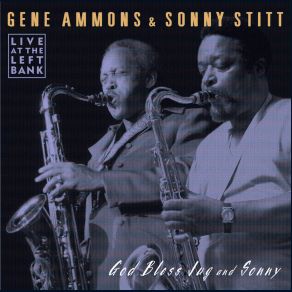God Bless Jug and Sonny
Download links and information about God Bless Jug and Sonny by Gene Ammons, Sonny Stitt. This album was released in 2001 and it belongs to Jazz genres. It contains 6 tracks with total duration of 01:07:50 minutes.

|
|
|---|---|
| Artist: | Gene Ammons, Sonny Stitt |
| Release date: | 2001 |
| Genre: | Jazz |
| Tracks: | 6 |
| Duration: | 01:07:50 |
| Buy it NOW at: | |
| Buy on iTunes $9.99 | |
| Buy on Amazon $9.49 | |
Tracks
[Edit]| No. | Title | Length |
|---|---|---|
| 1. | Blue 'N' Boogie | 16:28 |
| 2. | Stringin' the Jug | 14:55 |
| 3. | God Bless the Child | 5:47 |
| 4. | Autumn In New York | 5:05 |
| 5. | Ugetsu (featuring Sam Jones, Billy Higgins, The Cedar Walton) | 7:44 |
| 6. | Bye Bye Blackbird | 17:51 |
Details
[Edit]The focus of this exciting, if imperfect, CD is a 1973 reunion of Gene "Jug" Ammons and Sonny Stitt, who were responsible for some of the most famous tenor saxophone battles of the 1940s and early '50s. When the two locked horns, it was musical sportsmanship at its finest. Jug and Stitt had a mutual respect for one another, and their battles were the essence of friendly competition. Some die-hard beboppers might be disappointed to learn that God Bless Jug and Sonny (which was recorded live in Baltimore in 1973 but went unreleased until 2001) isn't all that competitive — the saxmen don't try to relive their legendary cutting contests of the 1940s and early '50s. Nonetheless, there are many inspired moments, and they enjoy a strong rapport on exuberant performances of "Blue 'n' Boogie," "Stringin' the Jug," and "Bye Bye Blackbird" (all of which employ Cedar Walton on piano, Sam Jones on bass, and Billy Higgins on drums). Ammons and Stitt don't play together on all of the tunes; Stitt lays out on Billie Holiday's "God Bless the Child," and Stitt is the only saxophonist on Vernon Duke's "Autumn in New York" (the only performance that finds Stitt on alto instead of tenor). And neither saxman is heard on Walton's "Ugetsu," a gem that lets the rhythm section shine by itself. When Ammons and Stitt play together, it's never hard to tell them apart. In contrast to the Charlie Parker-minded Stitt, Ammons had the sort of big, breathy, Coleman Hawkins-influenced tone you expected from a swing tenor (even though he was very much a bebopper/hard bopper). Unlike some of their 1940s/early '50s encounters, God Bless Jug and Sonny falls short of essential. But this 1973 reunion is still enjoyable and will interest the saxophonists' hardcore fans.